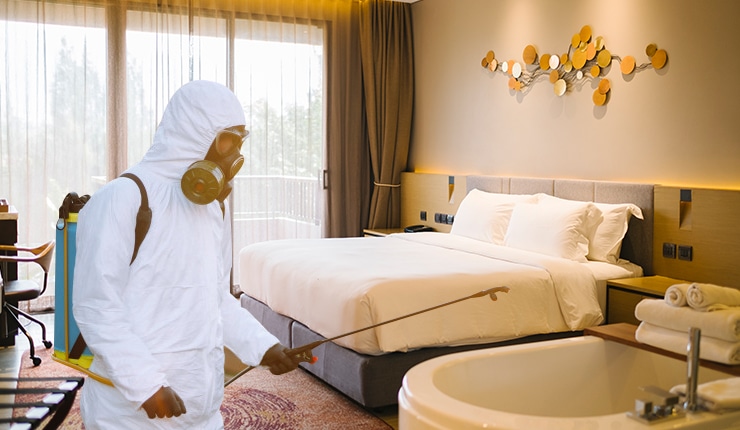When people make plans for long trips or vacations during summers, their travel desires are at the peak and a wanderlust within them starts getting flourished. But during this ongoing COVID-19 pandemic everything is at halt nowadays. And when it comes to traveling, people are suspicious and keep on thinking about safety in traveling. These days lockdown orders have been lifted a bit and people have started moving out of their houses. But so many travel restrictions are still there, so when you decide to go on a short trip somewhere or drive for a getaway, just think how safe is it to stay in a hotel?
“As with any public place, there are transmission risks in hotels,” Andria Rusk, research assistant professor specializing in global health and infectious disease at Florida International University’s College of Public Health & Social Work, tells POPSUGAR. “This risk comes from interacting with fomites — objects or surfaces that are likely to carry infection — or interacting with infected people. The risk in a hotel environment could come from interacting with hotel employees, such as front desk staff or housekeeping staff, or with other hotel guests.”
If we talk about the risk, there are many places in the hotel where there are comparatively more people are gathered, for example, public restrooms, business centers, fitness areas, or dining areas. Any high-touch surfaces — such as doorknobs, elevator buttons, ink pens for signing hotel agreements, pool railings, and stair banisters — also prone to the risk.

Although some renowned hotel chains like Hilton and Marriott have taken so many measures to enhance their cleaning regimens due to the COVID-19 outbreak, the Centers for Disease Control and Prevention advises not to travel unnecessarily nowadays because “travel increases your chances of getting infected and spreading COVID-19. Staying home is the best way to protect yourself and others from getting sick.”
Rusk further says, “It’s important to recognize that because COVID-19 is contagious even in asymptomatic, seemingly healthy people, the travelers have the potential to put hotel employees at risk as much as the other way around. This would also include other people encountered during travels, like in airports, gas stations, rental car counters, and restaurants.”
But if in case it becomes essential to stay in the hotel, what to do? For that kind of situation, there are a number of precautions you should take to make your stay safe. Wearing a mask is mandatory but along with that you must not forget to maintain social distancing and bringing your own bleach spray or disinfecting wipes would be beneficial as you are supposed to spray all over the surfaces and handles in a hotel including TV remote control and telephone.
Rusk also recommends that you should call the hotel to book preferably that room in which no housekeeping staff or guests have visited in the past three days. “This ensures that any viral copies are deactivated before you arrive, based on the latest data we have on SARS-CoV-2’s ability to survive on surfaces.”
Lastly, Rusk says, try to carry some snacks or your own eatables to avoid eating out. “That way you can limit your reliance on restaurants, take out, and hotel food by cooking for yourself.”
